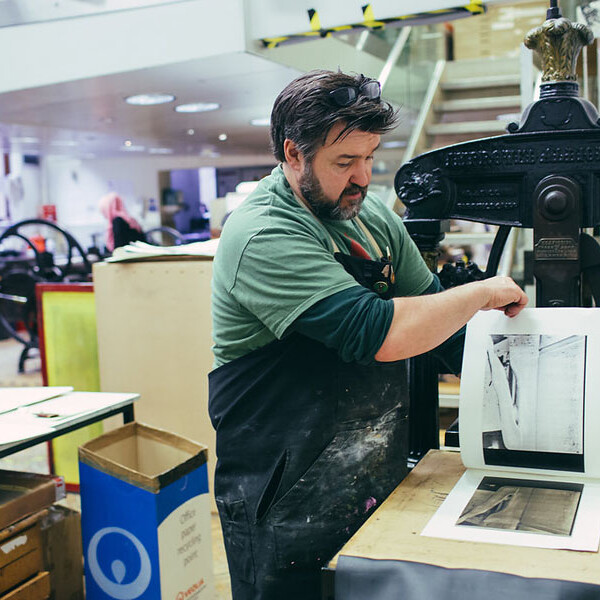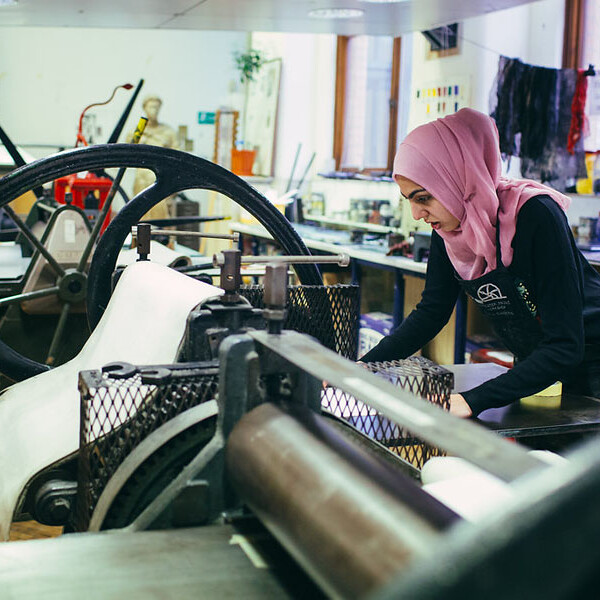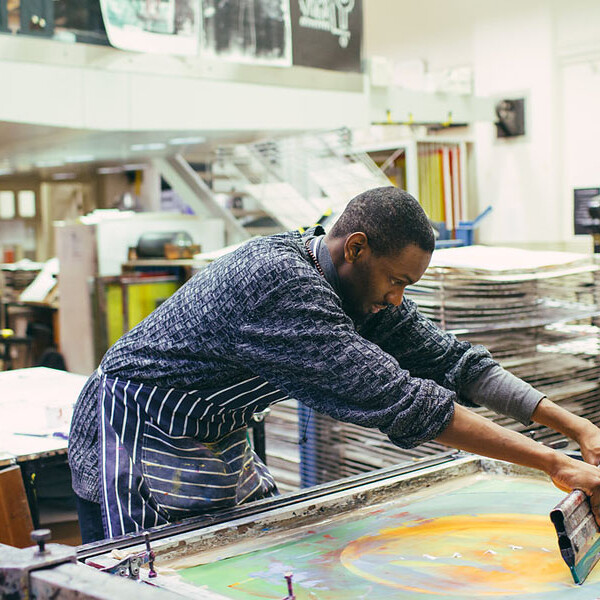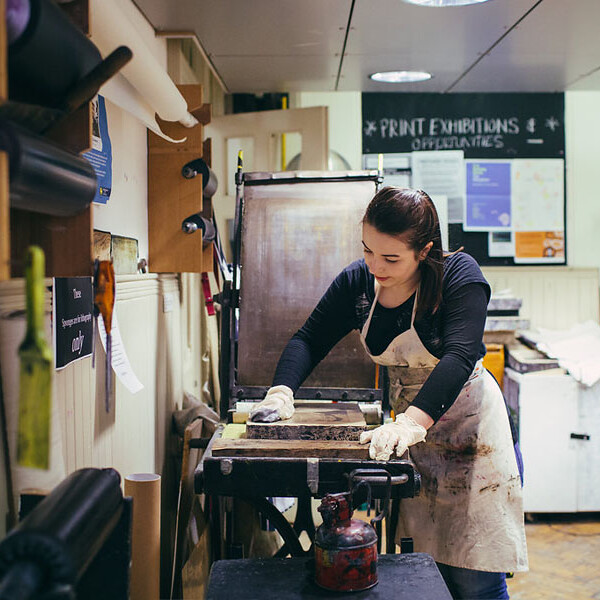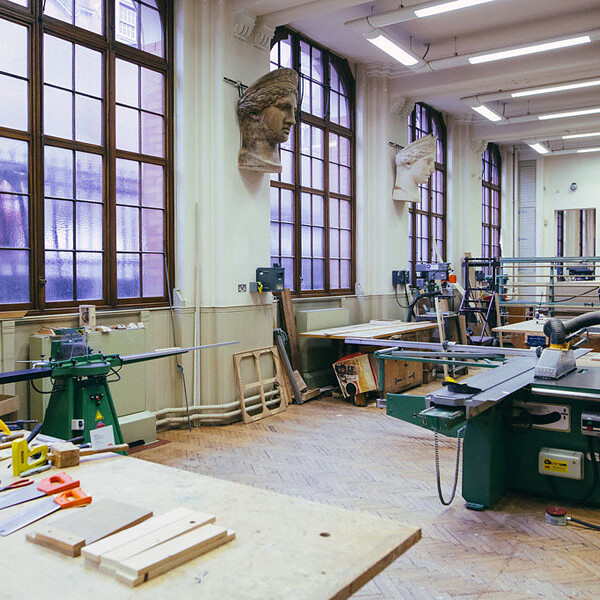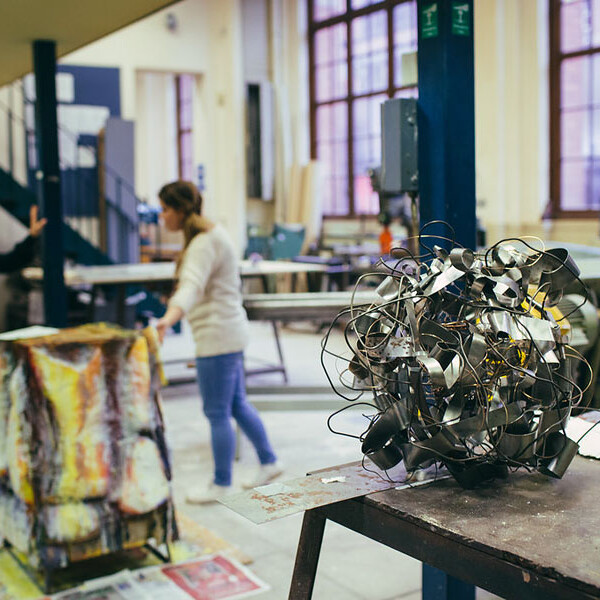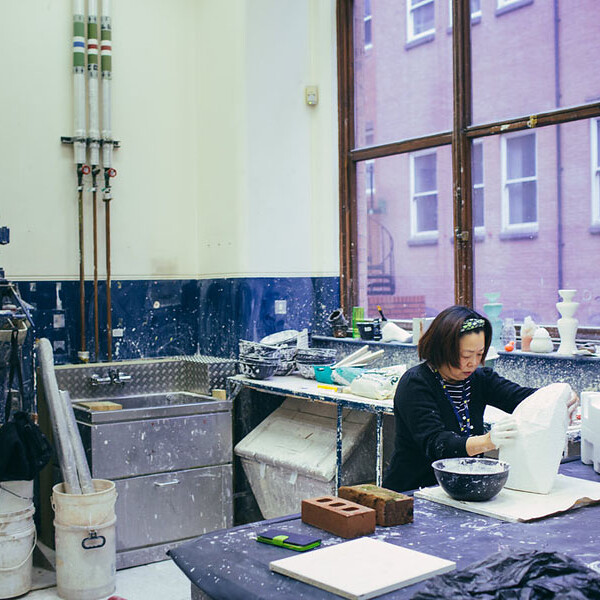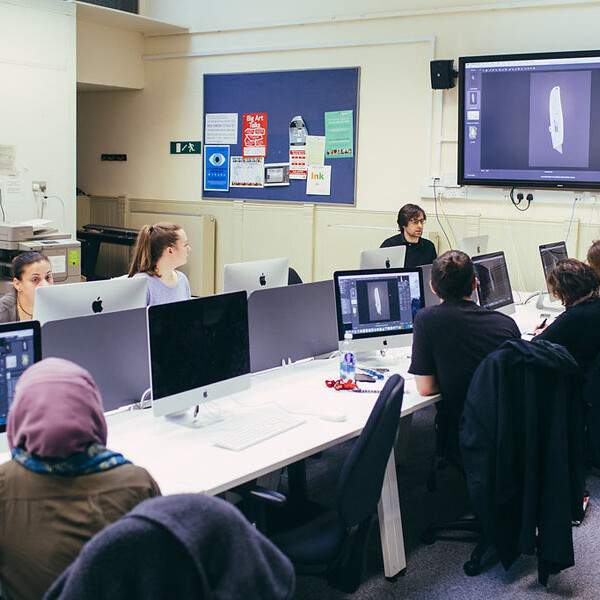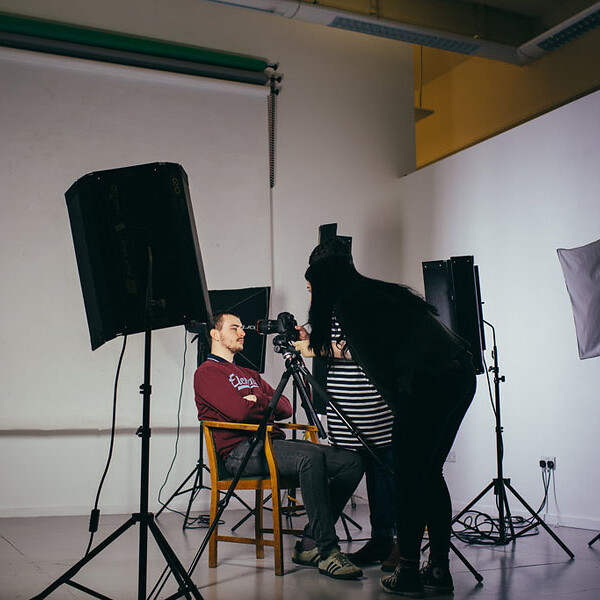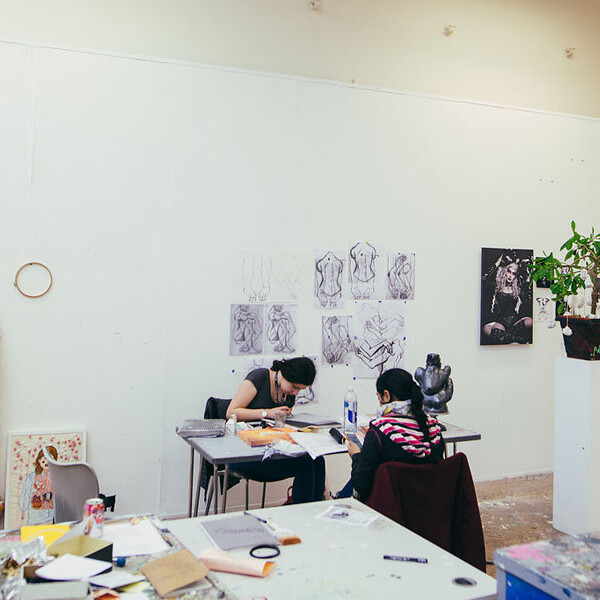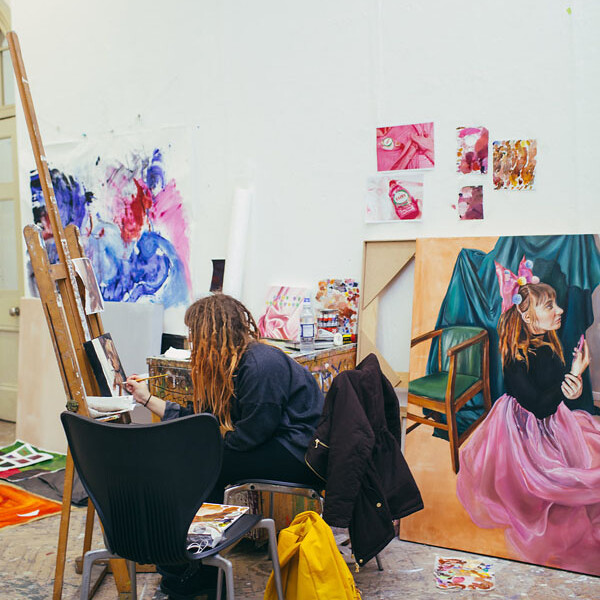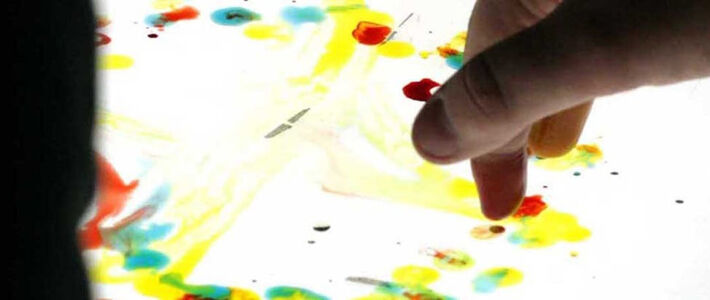
Art and Design Foundation Year - BA (Hons)
Currently viewing course to start in 2026/27 Entry.
This foundation year course has been specifically designed to support successful progression onto our suite of Art and Design degree courses, by allowing you to strengthen the creative skills you have developed during your previous studies....
- Level Foundation
- Study mode Full Time
- Award BA (Hons)
- Start date September 2026
- Fees View course fees
- Subject
- Location Margaret Street
This course is:
Open to International Students
Overview
0:01
[Music]
0:04
so originally when I signed up for the
0:06
course I was looking to do graphic
0:08
design afterwards but throughout the
0:09
course we are encouraged to sort of
0:11
experiment and try different things and
0:14
do things that are out of our comfort
0:15
zone and because of that I actually then
0:18
decided to go into fine art cuz that was
0:20
a kind of for me that was a course that
0:22
I could continue doing that sort of
0:24
experimental nature that was really
0:26
great in the foundation
0:28
in the foundation i was hoping to do a
0:30
bit of digital graphic stuff so I
0:32
thought maybe I'll explore a bit of that
0:35
and see if I like it and so that was my
0:37
main thing I wanted to explore my
0:40
interest is in painting and print making
0:42
that's what I am focusing on and I like
0:46
painting because I feel like just a lot
0:48
of very gestural
0:49
work i really enjoyed studying the
0:52
different modules because they were very
0:54
different so we started off with doing a
0:56
very experimental and broad module and
0:58
then we kind of found our way into doing
1:01
a more self-directed project and during
1:04
foundation year we there were also um
1:07
life drawing workshops held which I
1:09
really enjoyed so I've explored some
1:12
physical media working in the woodwork
1:14
section mostly and also doing some
1:16
sculpting work such as this behind me
1:19
and working with all sorts of different
1:21
technicians from the audio visual to as
1:23
I say woodwork and metal work and even
1:24
some sculpting as well i found exciting
1:27
was when we had different artists come
1:29
in especially um from different areas we
1:32
had fine arts coming graphic designers
1:34
coming and talking about their work and
1:36
we had little workshops on each thing
1:38
and that was quite exciting to get
1:40
insight what would be more like focusing
1:42
on each area one of the bits that I
1:45
thought was really great with the
1:46
foundation course was I think as I
1:48
started going in I may have had like
1:49
sort of a preconceived idea of like what
1:51
an art degree would be like with
1:53
foundation art but what I discovered
1:56
from doing this was that it can be it's
2:00
so broad and it can be sort of anything
2:02
I want it to be and with the course and
2:05
the the broadness of it I could you can
2:07
incorporate all of those things and you
2:09
can incorporate your interests and make
2:13
something out of that which I found
2:14
really exciting so the highlight of the
2:18
year has to be part of the shows where
2:20
I'll be showing off stuff like this but
2:22
also night school where you get to tap
2:24
in to see what other students are doing
2:26
and what workshops they're providing cuz
2:28
sometimes you get to join in and see
2:30
what they're doing and maybe get some
2:31
inspiration for building something
2:32
yourself so I've got a couple of
2:35
highlights and one would be the staff
2:37
staff was really supportive and
2:38
obviously coming into university and
2:40
never having met anyone they were just
2:42
the most welcoming and they made quite a
2:45
huge experience to it the highlight of
2:47
the year was the big show at the end i
2:50
think it from the very start how it all
2:52
came to the end it was mind-blowing and
2:54
I believe it was one of my best works
2:56
that I've did i'm very happy with it and
2:58
that was yeah amazing for me it was a
3:00
really proud moment that I could look
3:02
back at this culmination of all the work
3:05
that I'd done in the year and think
3:06
about to where I was at the beginning of
3:08
the foundation year and everything I'd
3:10
learned and to kind of see it i felt
3:13
like I think it was the first moment I
3:15
went "Yeah I am an artist." Like it's
3:17
all the things that I'd learned
3:20
[Music]
This foundation year course has been specifically designed to support successful progression onto our suite of Art and Design degree courses, by allowing you to strengthen the creative skills you have developed during your previous studies.
It is ideal preparation for those who are returning to formal study or who are progressing from non-arts backgrounds, as well as those who have not met the entry requirements for degree-level study.
Working in a lively and energetic environment, you will be given the freedom to expand your knowledge of practical skills, creative exploration and conceptual development, underpinned by broad critical understanding, academic writing and emerging theoretical principles.
There will be a range of opportunities to work on collaborative projects aimed to develop employability partnerships and to identify the role of developing practitioner. BA teaching staff from across our art and design courses will work with you throughout the year to prepare you for progression.
After successful completion of the foundation year, you will have the opportunity to progress to one of the following courses:
What's covered in this course?
Throughout the year you will be challenged with projects that question your current creative experiences and explore a breadth of experimentation to broaden your technical and critical understanding.
You will be encouraged to analyse methods and materials appropriate for creative development and to question your position in relation to historical, contemporary and future world scenarios. Both practical and written research tasks will be supported by one to one tutorials and small discussion groups to help you constructively build academic and social confidence.
The two first semester modules will form the building blocks for future work and will explore core principles of creative practice focussing on, the development of technical confidence, research, study skills and productivity.
The two final semester modules will give you greater autonomy, encourage positive integration between research and practice, challenging decision making and technical competency. This semester is designed to empower you with independent learning skills appropriate for your future BA studies.
Why Choose Us?
- Your Foundation Year gives you the chance to explore Art and Design, Digital Animation, Fine Art, Graphic Design, Illustration, Photography, and Product Design, giving you the flexibility to progress onto one of a number of undergraduate degree programmes.
- BCU prides itself on a long-established national and international reputation. It consists of a range of courses that celebrate innovation and allow you to realise your creative ambitions.
- You’ll be based within a community of artists at Birmingham School of Art, a Grade I-listed building that has been the inspiration for countless artists and practitioners of international reputation over the years. There has also been a multi-million-pound investment in facilities for photography, casting, woodwork, metalwork, silk screen, etching, 3D printing, laser cutting, and printed and constructed textiles.
Open Days
Join us for an Open Day where you'll be able to learn about this course in detail, chat to students, explore our campus and tour accommodation.
Next Open Day: 15 November 2025
Entry Requirements
Essential requirements
80 UCAS Tariff points. Learn more about UCAS Tariff points.
If you have a qualification that is not listed, please contact us.
Fees & How to Apply
UK students
Annual and modular tuition fees shown are applicable to the first year of study. The University reserves the right to increase fees for subsequent years of study in line with increases in inflation (capped at 5%) or to reflect changes in Government funding policies or changes agreed by Parliament. View fees for continuing students.
Award: BA (Hons)
Starting: Sep 2026
- Mode
- Duration
- Fees
- Full Time
- 4 years
- £9,535 in 2026/27
- Apply via UCAS
International students
Annual and modular tuition fees shown are applicable to the first year of study. The University reserves the right to increase fees for subsequent years of study in line with increases in inflation (capped at 5%) or to reflect changes in Government funding policies or changes agreed by Parliament. View fees for continuing students.
Award: BA (Hons)
Starting: Sep 2026
- Mode
- Duration
- Fees
- Full Time
- 4 years
- £18,570 in 2026/27
Guidance for UK students
UK students applying for most undergraduate degree courses in the UK will need to apply through UCAS.
The Universities and Colleges Admissions Service (UCAS) is a UK organisation responsible for managing applications to university and college.
Applying through UCAS
- Register with UCAS
- Login to UCAS and complete your details
- Select your course and write a personal statement
- Get a reference
- Pay your application fee and submit your application
You are not required to submit a portfolio for this course.
Course in Depth
Foundation Year
In order to complete this course, you must successfully complete all the following CORE modules (totalling 120 credits). On completion of your foundation year, you will progress onto one the following programmes:
- BA (Hons) Art and Design with Creative Technologies
- BA (Hons) Digital Animation
- BA (Hons) Fine Art
- BA (Hons) Graphic Design
- BA (Hons) Illustration
- BA (Hons) Photography
- BA (Hons) Product Design
Module information can be found on each course page.
This module explores the term ‘practice’ as the process of making, developing and recording information. We will work with you to explore the development of your work based on a set project, looking at a number of documentation strategies while experimenting with a broad range of materials. You will have the opportunity to meet artists and practitioners through local gallery visits and in studio activities and will learn to analyse your work through tutorials and small group discussions.
Artists work in a globally influenced, culturally diverse, and technologically advancing world.
Their art is a dynamic combination of materials, methods, concepts, and subjects that challenge traditional boundaries and defy easy definition.
This module will look at experimental approaches to drawing to identify radical new solutions from the perspective of the contemporary world we live in.
During this module you will meet lecturers, researchers and partners from across BCU, the city and further afield to open your understanding of practiced based creative work.
Through lectures and workshops, you will be introduced to the versatility of subject areas in terms of ideas, development, research, materials, techniques and contexts.
Figuring out how the universe works might be a bit more than we need to do each day but paying attention to the future of the world we live in, is worth exploring.
Creative realisation is not just about the practice of producing creative responses, it is about identifying the factors that generate creative thinking and facilitating the process.
For this module you will draw on your own creative strategies to facilitate the development of a project that is appropriate for progression onto your chosen BA (Hons) course.
Working in a lively and energetic environment you will be given the freedom to expand your knowledge in conceptual development, practical skills and creative exploration underpinned by broad critical understanding and emerging theoretical principles.
You will work individually and collaboratively to develop a stimulating visual portfolio of work that evidences your enthusiasm for further study within a specific subject area.
BA teaching staff will work with you throughout the course, and you will have full access to all of the University facilities.
Employability
This Foundation Year will prepare you for success on one of a number of degree courses, all of which have employability embedded into the curriculum to ensure that you are well-placed to progress into your chosen role or industry.
Opportunities include live briefs, placements, and links with industry, to ensure that you have a range of skills and experience.
For more information, see:
- BA (Hons) Art and Design with Creative Technologies – employability
- BA (Hons) Digital Animation – employability
- BA (Hons) Fine Art – employability
- BA (Hons) Graphic Design – employability
- BA (Hons) Illustration – employability
- BA (Hons) Photography – employability
- BA (Hons) Product Design – employability
Facilities & Staff
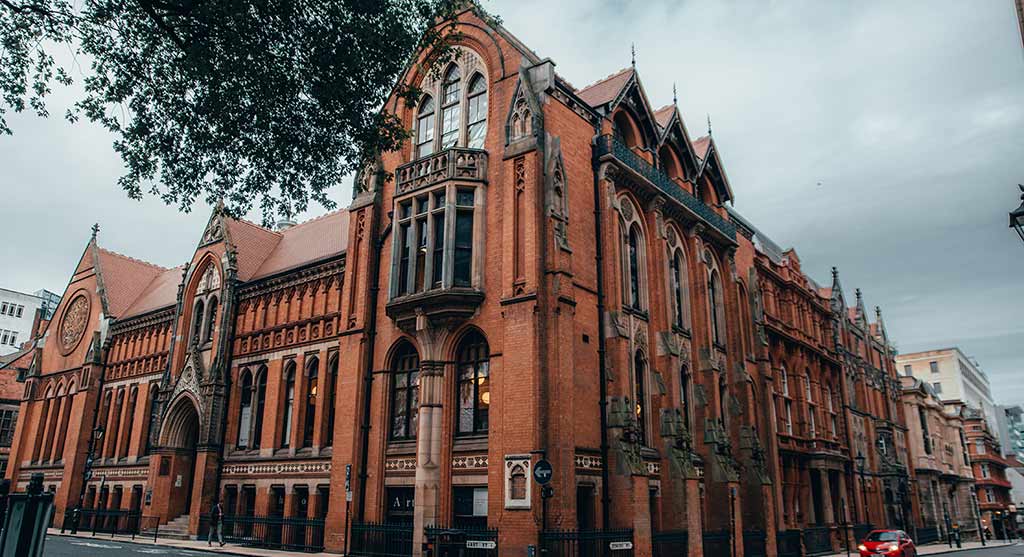
Our Facilities
In 1884 Birmingham Municipal School of Arts and Crafts - the first municipal school in the country, opened at Margaret Street. This building, with its rich history and rare heritage of practice-led knowledge, is home to our BA Art and Design course. The School provides an incredible resource for the production of art and design, and its associated fields of study. The building has a range of facilities available including studios, workshops, specialist art and design library, bookable spaces and lecture/seminar rooms.
Our course is situated within an inclusive physical studio environment. This incubator space has making at it’s heart, it is a place of doing, enabling agility and iteration. The layout is flexible and open plan. Like a laboratory, our space brings together the exploration of art, design and creative digital technologies to allow for the necessary collision and serendipity that innovative ideas creation now requires. The layout is loosely divided into Labs, and equipment within the Labs will be on open display and ready to use. These resources will be in addition to the extensive workshops already available in Margaret Street, that include photography, casting, woodwork, metalwork, silk screen, etching, 3D printing, laser cutting, and printed and constructed textiles.
The specialist library, workshops and studio facilities at the School of Art provide a hub of creative activity for you to immerse yourself within.


